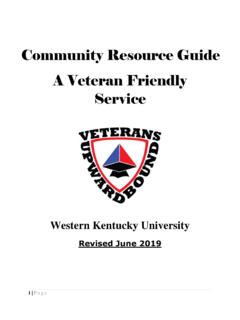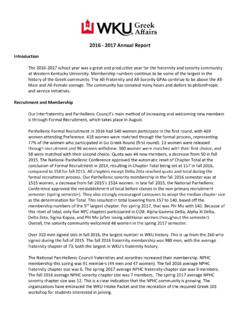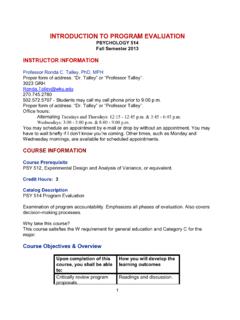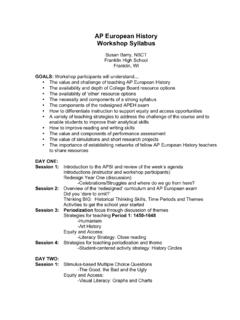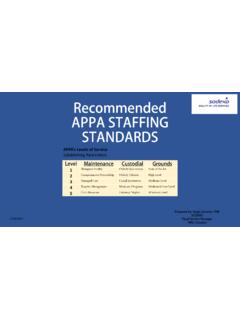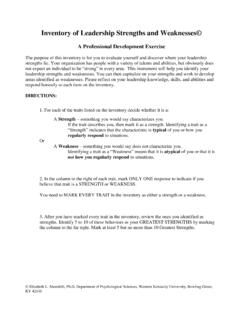Transcription of Author: Lorraine Bormann, PhD, RN, MHA, CPHQ, FACHE
1 1 Title of the presentation: institute of Medicine Core Competencies for Health Professionals: Foundation for Care Coordination in Practice Topic or category: Evidence based Healthcare Author: Lorraine Bormann, PhD, RN, MHA, CPHQ, FACHE Presented at the 8th Annual Care Coordination Conference in Baltimore, Maryland on May 10, 2016 Baccalaureate of Science in Nursing (BSN) prepared nurses are often unprepared to coordinate patient care for the best possible outcomes for the patient and for the health care organization. The Carnegie Foundation Report (2010) and the National League for Nursing position statement (NLN, 2003) called for nursing education reform.
2 The authors were motivated by the need to include more information in nursing education about the institute of Medicine (IOM) reports on quality health care, with a focus on the five core competencies identified by the IOM for all healthcare professions. It is more imperative today, due to the greater emphasis on improving health care and safety in the United States. Nursing students cover much information in their courses and develop clinical competencies in a short period of time. It is critical that each student and faculty recognize that nursing does not happen in isolation, but rather it is part of the entire healthcare experience.
3 Nurses and healthcare leaders play critical roles in this experience through individual professional roles, responsibilities, and leadership. We are all members of the healthcare team and must work together to provide and improve care. (Finkelman & Kenner, 2013, p. xiii). Nursing curriculum now includes the Quality and Safety Education in Nursing (QSEN) competencies (AACN, 2008) but there are many nurses in practice that are not aware of these concepts and competencies. A strategy for successful care coordination includes an understanding and implementation of the core competencies for all healthcare professionals as described by the institute of Medicine (IOM, 2003) to include: 1) patient-centered care, 2) teamwork and collaboration, 3) evidence-based practice, 4) quality improvement, and 5) informatics.
4 The Quality and Safety Education in Nursing (QSEN) model, described by the American Association of Colleges of Nursing (QSEN, 2014), added the safety competency. The QSEN Model is a value model that emphasizes competence to protect patient safety, defines the most current trends in nursing practice, and employs an integrative paradigm in defining nursing practice . Understanding basic nursing practice is the foundation that is necessary to further define and develop care coordination in both academia and in practice. Introducing the concept-based QSEN into the new-hire orientation program as a foundation for practice will provide the foundation for all healthcare workers to enhance the care coordination efforts.
5 This topic was presented at the 8th Annual Care Coordination Conference in Baltimore, Maryland on May 10, 2016. The program objectives were to: 1) Implement a logically stepped approach to introducing concept-based QSEN into the new-hire orientation program, 2) Include resources for teaching QSEN in the practice setting, and 3) Increase care coordination by assimilating the information, gaining a deeper level of understanding, and increasing motivation for learning. It is important to implement a logically stepped approach to applying the core competencies from the IOM and QSEN model from the AACN as a foundation for care coordination in practice because we are still trying to define care coordination.
6 These concepts give an evidence-based approach to putting a foundation in place. There are many free resources for learning about QSEN as you consider 2 implementing these concepts into a new hire orientation program (QSEN, 2014). It takes understanding and motivation; leadership; and the desire to make the change. Speaker bio: Dr. Bormann graduated from Western Kentucky University with an Associate Degree in Nursing, a Baccalaureate in Healthcare Administration and a Master s Degree in Healthcare Administration. She received her PhD in Educational Leadership and Organizational Development from University of Louisville with a focus in Human Resources.
7 She is a Fellow in the American College of Healthcare Executives and is a Certified Professional in Healthcare Quality. She is currently teaching in the undergraduate and graduate programs in the School of Nursing at Western Kentucky University. Dr. Bormann received the Excellence in Teaching Award from Sigma Theta Tau International and the Faculty Award for Teaching from WKU College of Health and Human Services. References: American Association of Colleges of Nursing [AACN]. (2008). The essentials of baccalaureate education for professional nursing practice.
8 Washington, DC: Author. Carnegie Foundation Report. (2010). Educating nurses: A call for radical transformation. Retrieved from radical-transformation Finkelman, A. & Kenner, C. (2013). Professional nursing concepts: Competencies for quality leadership. Burlington, MA: Jones & Bartlett Learning. institute of Medicine. (2003). Health professions education: A bridge to quality. Washington, DC: National Academies Press. National League for Nursing. (2003). Position statement: Innovation in nursing education: A call to reform.
9 Retrieved May 8, 2014 from Quality and Safety Education in Nursing [QSEN]. (2014). AACN launches free QSEN learning module series. Retrieved from Contact Information: Lorraine Bormann, PhD, RN, MHA, CPHQ, FACHE Associate Professor Western Kentucky University School of Nursing 1106 College Heights Blvd, #11036 Bowling Green, Kentucky 42101 Office phone: 270-745-3690 Cell phone: 270-779-7891

